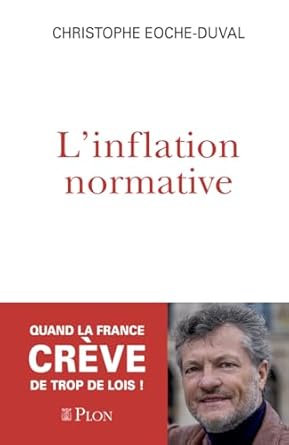For several years, Christophe EOCHE-DUVAL has made overproduction of legislation his hobbyhorse and in this book, he offers an objective inventory of the normative apparatus. This is in order to enlighten the reader and to make them aware of the impacts of this overproduction on the functioning of our country.
First of all, the author focuses on factually demonstrating this overabundance of standards. To measure this, he relies on the number of pages of the “Official Journal” and on the annual report “Statistics of the norm” of the General Secretariat of the Government established since 2019. From the latter, we can note the number of “Légifrance” words registered in the “Official Journal” as well as in all the standards (laws, ordinances, decrees, orders, etc.). The findings are clear: with more than 400,000 standards already in force, the number of “Légifrance” words has more than doubled in 20 years, reaching more than 46 million in 2024. Also, over the years, the State publishes fewer texts but they are getting longer and longer.
In order to understand this inflation, the author presents the sources. International standards, including those of the UN and its satellites, are the primary providers of standards. Each bill has been ratified by the French Parliament since 1958, although this is not mandatory. Then come the European standards that automatically enter into force in national law. Other strata are added to the previous ones, such as prefectural and municipal by-laws, the exact number of which seems impossible to know.
Once the inventory is complete, the author seeks to measure the impacts and notes that these standards often paralyze the productive apparatus in all sectors of activity. To make it more noticeable, he tries to estimate the cost. The various analyses seem to converge towards a figure of 3.7% of GDP, or about 60 billion per year.
Beyond the cost aspect, these overlapping standards that have accumulated since the beginning of the Fifth Republic at the mercy of the various heads of state, makes it difficult to know which version is in force at the time this document is being written. The State, itself caught in this vice, ends up circumventing the rules in order to speed up the machine that produces the standards. In recent years, the triggering of Article 49.3 or the publication of ordinances, allowing the executive to pass laws in place of Parliament, are examples.
The author dedicates a chapter to two accelerators of normative inflation: the finance and Social Security financing laws. These laws, based on government texts, must be validated in a limited time; not allowing sufficient parliamentary time.
Another effect of this normative inflation is exposed in the chapter “Legiscracy against democracy”, since only 4% of French people are able to understand the texts and laws.
Despite this terrible observation where the state and politicians seem to be caught and struggle to get out of this straitjacket, the author proposes pragmatic solutions which, he hopes, can be raised during the debates of the next presidential election in 2027.
He insists on legislating less and focusing on applying existing laws by lowering the normative pace, thus freeing up parliamentary time. He also advocates transparency on the costs of implementing laws to better assess their relevance.
This book has a pedagogical virtue for any reader in search of a better understanding of our legislative arsenal.
Christophe EOCHE-DUVAL is a senior civil servant and state advisor.






